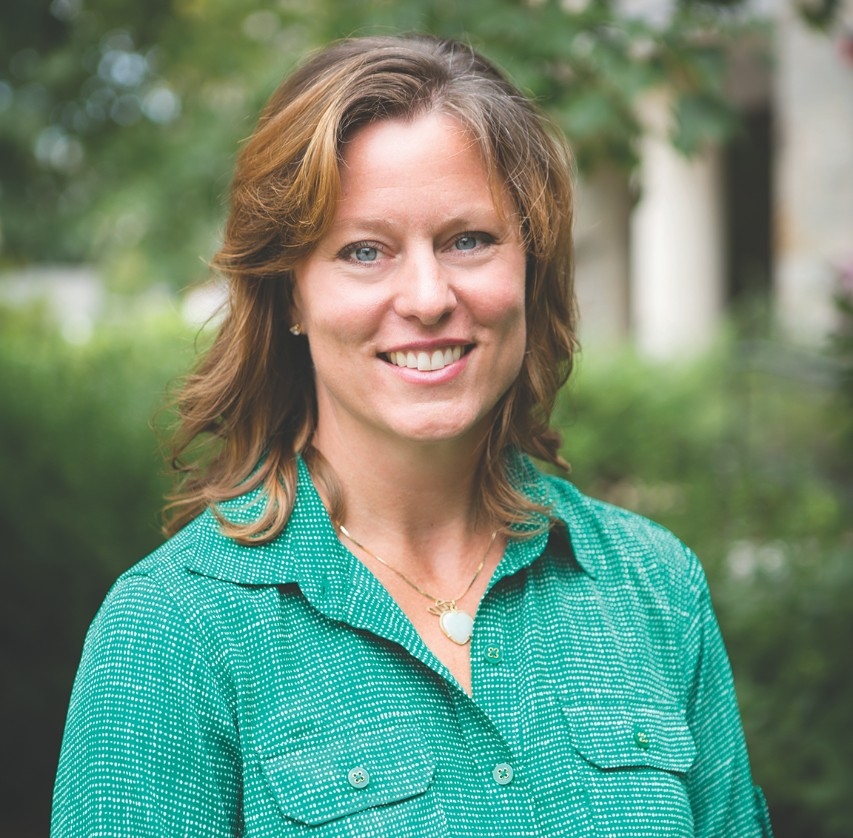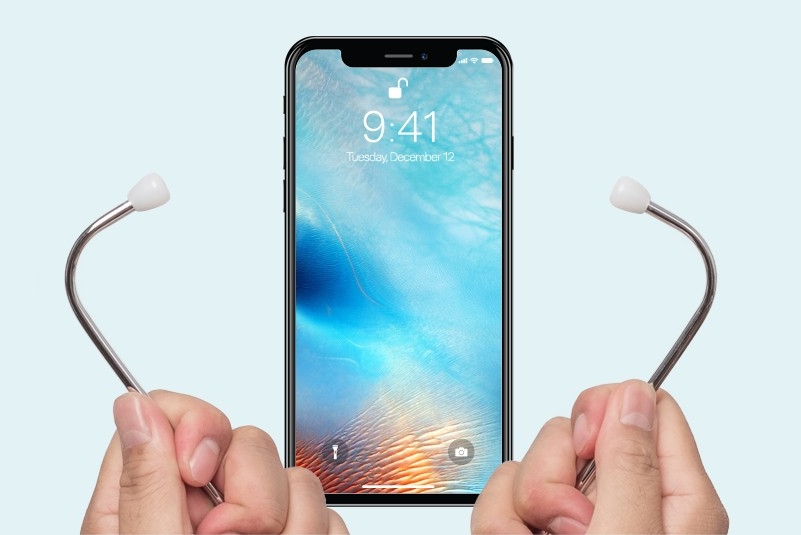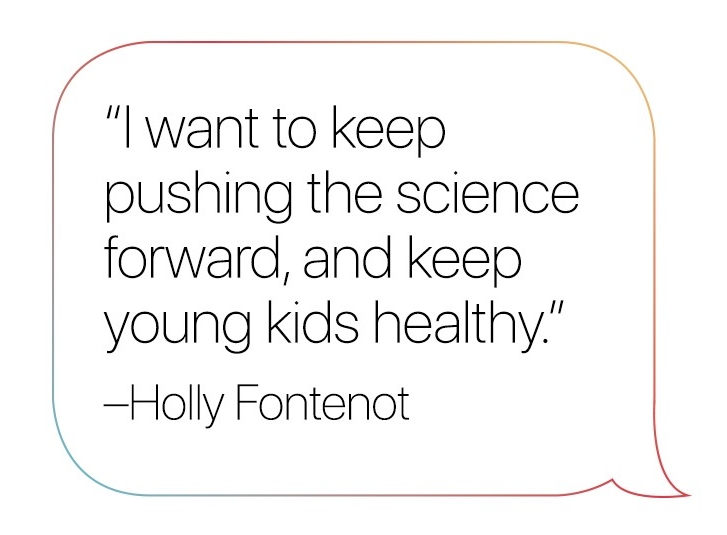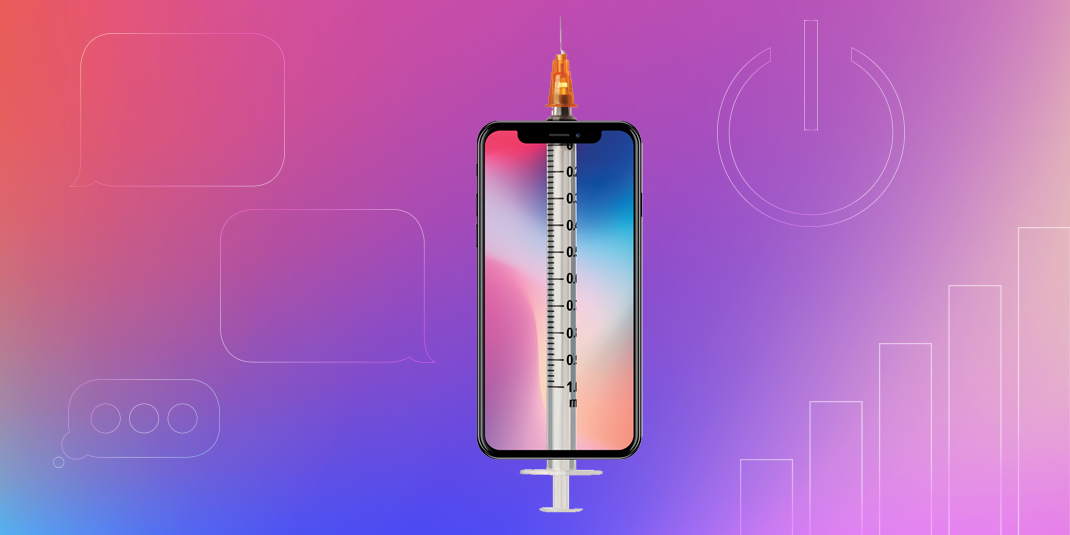Holly Fontenot had a “total lightbulb moment” in 2014. The Connell School of Nursing (CSON) assistant professor, who’s spent most of her academic career focused on women’s health, is also a part-time nurse practitioner and nurse scientist at the Sidney Borum Jr. Health Center, where she works with at-risk lesbian, gay, bisexual, transgender, and queer (LGBTQ) adolescents and young adults.
Fontenot had convened a focus group of young men in hopes of finding out why so few were getting injections of the human papillomavirus (HPV) vaccine, which can prevent certain cancers in males. Some participants told her they hadn’t heard of the vaccine or thought it was just for young women. Others said they couldn’t afford the shots. Still others admitted they were embarrassed to ask for the vaccine. Then one young man said, “I won’t even order a pizza unless I can do it with an app. I don’t want to talk to anybody.” Heads around the room nodded.

Fontenot realized then, she says, that promoting healthy behaviors in young people today requires a new approach. “They live, en masse, online,” says Fontenot. That seemed to her particularly true of the young men who have sex with men (YMSM), a large segment of the patient population she treats in her clinical work at the Borum Health Center on Kneeland Street in Boston, which is part of Fenway Health, a community health center that has long served LGBTQ patients from Boston’s neighborhoods. Fontenot came to believe that creative use of mobile technology could be key to convincing more YMSM to seek out the vaccine.
She now thinks that the same approach could help eliminate other gaps in meeting basic health needs that are common among at-risk populations. “Can we tap into that online community and get them to engage in real-world actions, like showing up at a clinic?” asks Fontenot. “We’re going to see if that’s possible.” She is currently principal investigator for a two-year study funded by the National Institute of Allergy and Infectious Diseases (NIAID), in which she is conducting more focus groups and overseeing the development of a mobile application, or app, which she hopes will help increase the number of YMSM who receive the HPV vaccine.
Meanwhile, Fontenot is playing key roles in two other federally funded initiatives: a Centers for Disease Control and Prevention (CDC) effort to develop tools and strategies to reduce the risk of human immunodeficiency virus (HIV) in YMSM; and an effort, supported by the National Institutes of Health (NIH) and the Harvard Center for AIDS Research (CFAR), to eliminate barriers that keep YMSM from receiving a medication known as pre-exposure prophylaxis (PrEP), which lowers the risk for acquiring HIV.
A member of the CSON faculty since 2004, Fontenot has worked as a labor and delivery nurse and spent much of the first phase of her academic career focused on teaching and women’s health. (She recently received the Award of Excellence in Scholarly Education from the Association of Women’s Health, Obstetric and Neonatal Nurses.) She served as director of the Women’s Health Nurse Practitioner Program from 2007 until last January. Teaching is still on her schedule; in spring 2018 she’ll co-teach Current Issues in Sexual Health Care with Assistant Professor Nadia Abuelezam.
However, Fontenot is deeply focused on research these days. Her early work as a nurse scientist concentrated on sexual health in young women. But she soon became frustrated. “I felt like I was missing a big part of the picture,” recalls the native Californian, who received both a master’s degree in 2000 and a Ph.D. in 2013 from CSON. When Fontenot volunteered her services at the Borum and turned her attention to the sexual health of young males, she soon discovered that misconceptions and other barriers left many vulnerable to life-threatening diseases. She is now squarely focused on finding ways to curb those threats.

Fontenot became interested in the HPV vaccine after it was approved by the Food and Drug Administration (FDA) in 2006. One of the most common sexually transmitted infections, HPV can cause cervical cancer and other gynecological malignancies in women. But HPV promotes cancers in males too—including anal, penile, and oropharyngeal (mouth and throat) malignancies. (According to some projections, the annual number of oropharyngeal cancers will surpass cases of cervical cancer by 2020.)
In 2009, the FDA approved the HPV vaccine for young males. But when Fontenot tracked national data, she saw that few were receiving it. That’s when she began conducting focus groups with young males and found that most didn’t know about the vaccine or thought HPV was only a concern for women. When Fontenot and some of her colleagues reviewed medical records at the Borum Center, they found that just eight percent of the males had received at least one dose of the vaccine. (Two doses are required to protect boys aged 9 to 14; three doses for males aged 15 to 26.)
“If you look at the science, young gay men have probably the absolute lowest level of [HPV] vaccine rates as compared to any other group,” says Fontenot. That’s at least partly because the vaccine has an image problem, says one of Fontenot’s frequent collaborators, Gregory Zimet, Ph.D., a professor of pediatrics and clinical psychology at the Indiana University School of Medicine, who has conducted extensive research on attitudes about the HPV vaccine. “There is a common perception that the reason males should get the vaccine is to prevent HPV infections in girls,” says Zimet. “But YMSM don’t sleep with girls.”
Moreover, many of the patients Fontenot treats are homeless. “They have a lot of unique challenges and low levels of support—from family or society at large,” says Fontenot. Many are too busy finding a place to sleep to spend much time thinking about their health care, she says. Add the many other barriers she discovered in her focus groups, says Fontenot, and it’s hardly surprising that vaccination rates among YMSM are so low.
Fontenot has embraced the challenge of helping close the vaccination gap and others she sees in her clinical practice. “The fundamental issue that informs Holly’s work is a commitment to underserved populations,” says Kenneth Mayer, M.D., medical research director and co-chair of The Fenway Institute, a research arm of Fenway Health. Fontenot meets regularly with Mayer to discuss research ideas and the two have teamed with Penn State Assistant Professor of Biobehavioral Health Joshua Rosenberger, Ph.D., and Zimet to conduct the NIAID-funded initiative to develop and test an app to increase the number of YMSM who receive the HPV vaccination. “Holly is a phenomenal collaborator,” says Zimet. “She’s really smart and creative, but what sets her apart is her energy and positive outlook.”

The goal of the National Institute of Allergy and Infectious Diseases study is to create an app that promotes awareness of the HPV vaccine and makes it easier for young men to get it. Functions that are under development would help them make appointments at clinics, for example, and apply for insurance or financial assistance to cover costs. Once the study is completed next year, the app will be promoted on a social networking app. To find out what users might want and value in such an app, Fontenot has already conducted online focus groups that included young men in Boston, New York City, and Philadelphia. “The conversations were really rich. We got all kinds of great ideas,” says Fontenot, who suspects that participants may be more willing to share details about their intimate lives when typing on a computer or smartphone than seated at a conference table in a roomful of people.
Fontenot learned about conducting online focus groups from Rosenberger. Her newfound expertise, along with her skills working with young people, has raised her profile and increased demand for her as a scientific collaborator. She’s running online focus groups that will contribute key data to the CDC effort to develop tools and strategies for preventing HIV in YMSM. In that study, she’s collaborating with colleagues at the CDC, The Fenway Institute (where she now holds an adjunct faculty appointment), and the University of Chicago’s NORC research institute.
The goal of these focus groups will be to learn about the young participants’ awareness of HIV risk, access to sex education and methods for preventing HIV (such as condoms), and other relevant issues. Fontenot plays a similar role in the NIH/CFAR study, which will test whether YMSM are more likely to take the HIV-preventive drug combination known as PrEP if they have access to a “peer navigator,” which is a mentor or counselor who can provide emotional support and help them with practical matters such as filling prescriptions. PrEP, sold under the brand name Truvada, has been shown to reduce the risk of acquiring HIV by more than 90 percent. “We know HIV disproportionately affects youth and YMSM,” says Fontenot. Expanding the use of PrEP, she believes, “can transform HIV prevention.”
Fontenot is already helping to transform young lives. One of the greatest rewards of her work in the clinic, she says, is seeing her patients get off the street, find jobs, and f lourish. In her new and evolving role as a nurse scientist, she hopes to find innovative ways to eliminate health disparities that can prevent that from happening. “I want to keep pushing the science forward,” says Fontenot. “And keep young kids healthy.” ▪
—By Timothy Gower
Fontenot portrait: Lee Pellegrini
Graphic design: Christine Hunt
Artwork: iStock.com/pinstock/ExtraDryRain



